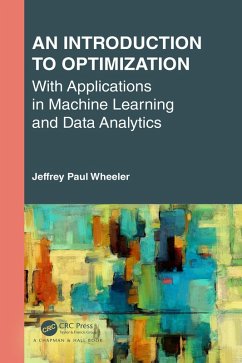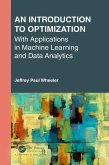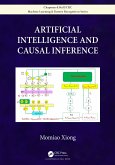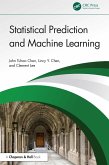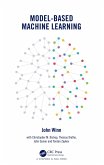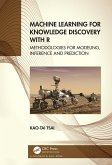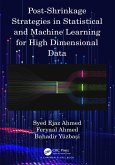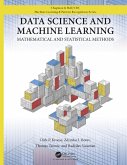Jeffrey Paul Wheeler
An Introduction to Optimization with Applications in Machine Learning and Data Analytics (eBook, PDF)
97,95 €
97,95 €
inkl. MwSt.
Sofort per Download lieferbar

49 °P sammeln
97,95 €
Als Download kaufen

97,95 €
inkl. MwSt.
Sofort per Download lieferbar

49 °P sammeln
Jetzt verschenken
Alle Infos zum eBook verschenken
97,95 €
inkl. MwSt.
Sofort per Download lieferbar
Alle Infos zum eBook verschenken

49 °P sammeln
Jeffrey Paul Wheeler
An Introduction to Optimization with Applications in Machine Learning and Data Analytics (eBook, PDF)
- Format: PDF
- Merkliste
- Auf die Merkliste
- Bewerten Bewerten
- Teilen
- Produkt teilen
- Produkterinnerung
- Produkterinnerung

Bitte loggen Sie sich zunächst in Ihr Kundenkonto ein oder registrieren Sie sich bei
bücher.de, um das eBook-Abo tolino select nutzen zu können.
Hier können Sie sich einloggen
Hier können Sie sich einloggen
Sie sind bereits eingeloggt. Klicken Sie auf 2. tolino select Abo, um fortzufahren.

Bitte loggen Sie sich zunächst in Ihr Kundenkonto ein oder registrieren Sie sich bei bücher.de, um das eBook-Abo tolino select nutzen zu können.
The text introduces students to numerous methods in solving a variety of Optimization problems. Also, the narrow focus of most math textbooks is completely dedicated to nonlinear programming, linear programming, combinatorial or convex optimization.
- Geräte: PC
- mit Kopierschutz
- eBook Hilfe
Andere Kunden interessierten sich auch für
![An Introduction to Optimization with Applications in Machine Learning and Data Analytics (eBook, ePUB) An Introduction to Optimization with Applications in Machine Learning and Data Analytics (eBook, ePUB)]() Jeffrey Paul WheelerAn Introduction to Optimization with Applications in Machine Learning and Data Analytics (eBook, ePUB)97,95 €
Jeffrey Paul WheelerAn Introduction to Optimization with Applications in Machine Learning and Data Analytics (eBook, ePUB)97,95 €![Artificial Intelligence and Causal Inference (eBook, PDF) Artificial Intelligence and Causal Inference (eBook, PDF)]() Momiao XiongArtificial Intelligence and Causal Inference (eBook, PDF)47,95 €
Momiao XiongArtificial Intelligence and Causal Inference (eBook, PDF)47,95 €![Statistical Prediction and Machine Learning (eBook, PDF) Statistical Prediction and Machine Learning (eBook, PDF)]() John Tuhao ChenStatistical Prediction and Machine Learning (eBook, PDF)86,95 €
John Tuhao ChenStatistical Prediction and Machine Learning (eBook, PDF)86,95 €![Model-Based Machine Learning (eBook, PDF) Model-Based Machine Learning (eBook, PDF)]() John WinnModel-Based Machine Learning (eBook, PDF)75,95 €
John WinnModel-Based Machine Learning (eBook, PDF)75,95 €![Machine Learning for Knowledge Discovery with R (eBook, PDF) Machine Learning for Knowledge Discovery with R (eBook, PDF)]() Kao-Tai TsaiMachine Learning for Knowledge Discovery with R (eBook, PDF)48,95 €
Kao-Tai TsaiMachine Learning for Knowledge Discovery with R (eBook, PDF)48,95 €![Post-Shrinkage Strategies in Statistical and Machine Learning for High Dimensional Data (eBook, PDF) Post-Shrinkage Strategies in Statistical and Machine Learning for High Dimensional Data (eBook, PDF)]() Syed Ejaz AhmedPost-Shrinkage Strategies in Statistical and Machine Learning for High Dimensional Data (eBook, PDF)52,95 €
Syed Ejaz AhmedPost-Shrinkage Strategies in Statistical and Machine Learning for High Dimensional Data (eBook, PDF)52,95 €![Data Science and Machine Learning (eBook, PDF) Data Science and Machine Learning (eBook, PDF)]() Dirk P. KroeseData Science and Machine Learning (eBook, PDF)96,95 €
Dirk P. KroeseData Science and Machine Learning (eBook, PDF)96,95 €-
-
-
The text introduces students to numerous methods in solving a variety of Optimization problems. Also, the narrow focus of most math textbooks is completely dedicated to nonlinear programming, linear programming, combinatorial or convex optimization.
Dieser Download kann aus rechtlichen Gründen nur mit Rechnungsadresse in A, B, BG, CY, CZ, D, DK, EW, E, FIN, F, GR, HR, H, IRL, I, LT, L, LR, M, NL, PL, P, R, S, SLO, SK ausgeliefert werden.
Produktdetails
- Produktdetails
- Verlag: Taylor & Francis eBooks
- Seitenzahl: 473
- Erscheinungstermin: 7. Dezember 2023
- Englisch
- ISBN-13: 9781003803591
- Artikelnr.: 69231932
- Verlag: Taylor & Francis eBooks
- Seitenzahl: 473
- Erscheinungstermin: 7. Dezember 2023
- Englisch
- ISBN-13: 9781003803591
- Artikelnr.: 69231932
- Herstellerkennzeichnung Die Herstellerinformationen sind derzeit nicht verfügbar.
Jeffrey Paul Wheeler earned his PhD in Combinatorial Number Theory from the University of Memphis by extending what had been a conjecture of Erdos on the integers to finite groups. He has published, given talks at numerous schools, and twice been a guest of Trinity College at the University of Cambridge. He has taught mathematics at Miami University (Ohio), the University of Tennessee-Knoxville, the University of Memphis, Rhodes College, the University of Pittsburgh, Carnegie Mellon University, and Duquesne University. He has received numerous teaching awards and is currently in the Department of Mathematics at the University of Pittsburgh. He also occasionally teaches for Pitt's Computer Science Department and the College of Business Administration. Dr. Wheeler's Optimization course was one of the original thirty to participate in the Mathematical Association of America's NSF-funded PIC Math program.
1. 1. Preamble. 2. The Language of Optimization. 3. Computational Complexity. 4. Algebra Review. 5. Matrix Factorization. 6. Linear Programming. 7. Sensitivity Analysis. 8. Integer Linear Programing. 9. Calculus Review. 10. A Calculus Approach to Nonlinear Programming. 11. Constrained Nonlinear Programming: Lagrange Multipliers and the KKT Conditions. 12. Optimization involving Quadratic Forms. 13. Iterative Methods. 14. Derivative-Free Methods. 15. Search Algorithms. 16. Important Sets for Optimization. 17. The Fundamental Theorem of Linear Programming. 18. Convex Functions. 19. Convex Optimization. 20. An Introduction to Combinatorics. 21. An Introduction to Graph Theory. 22. Network Flows. 23. Minimum-Weight Spanning Trees and Shortest Paths. 24. Network Modeling and the Transshipment Problem. 25. The Traveling Salesperson Problem. Probability. 27. Regression Analysis via Least Squares. 28. Forecasting. 29. Introduction to Machine Learning.
1. 1. Preamble. 2. The Language of Optimization. 3. Computational Complexity. 4. Algebra Review. 5. Matrix Factorization. 6. Linear Programming. 7. Sensitivity Analysis. 8. Integer Linear Programing. 9. Calculus Review. 10. A Calculus Approach to Nonlinear Programming. 11. Constrained Nonlinear Programming: Lagrange Multipliers and the KKT Conditions. 12. Optimization involving Quadratic Forms. 13. Iterative Methods. 14. Derivative-Free Methods. 15. Search Algorithms. 16. Important Sets for Optimization. 17. The Fundamental Theorem of Linear Programming. 18. Convex Functions. 19. Convex Optimization. 20. An Introduction to Combinatorics. 21. An Introduction to Graph Theory. 22. Network Flows. 23. Minimum-Weight Spanning Trees and Shortest Paths. 24. Network Modeling and the Transshipment Problem. 25. The Traveling Salesperson Problem. Probability. 27. Regression Analysis via Least Squares. 28. Forecasting. 29. Introduction to Machine Learning.
